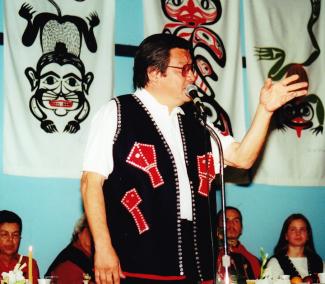
Dear Allard Law Community,
We are deeply saddened by the passing of Hereditary Chief Bill Wilson, Hemas Kla-Lee-Lee-Kla, on January 24, 2025. As the second Indigenous graduate from our law school in 1973, Chief Wilson’s legacy is woven into the fabric of the Peter A. Allard School of Law.
Chief Wilson is remembered as a powerful advocate for the rights of Indigenous peoples and a force for change, and his commitment to Indigenous rights has left an indelible mark on our institution and Canadian constitutional law. His central and powerful role in the Constitutional Conferences, following the entrenchment of section 35 of the Constitution Act, 1982, inspired later Indigenous lawyers and political leaders to press for a more expansive reading of section 35, enshrining Indigenous title to traditional lands and treaty rights and challenging and expanding the prevailing interpretations of Indigenous rights in Canadian law.
“The work we did changed this province and the country,” Chief Wilson told the law school in 2011.
A masterful orator, Chief Wilson challenged those around him to be their best and to never accept the status quo. His intellectual rigour and passionate advocacy not only advanced the discourse on Indigenous sovereignty, but also inspired generations of Indigenous legal scholars, practitioners, advocates and allies. Chief Wilson’s legacy continues to influence our curriculum, our Indigenous Legal Studies community and our ongoing commitment to justice and equality as we set a path toward reconciliation.
While disillusioned by aspects of his law school experience, during his time as a law student, Chief Wilson was remarkably accomplished, taking on roles with organizations including the British Columbia Association of Non-Status Indians, the Federation of Saskatchewan Indians, the Council of Yukon Indian Brotherhood, the Council of Yukon Indian–Métis–Non-Status, and the Union of BC Indian Chiefs. His legacy from this period includes advocating for and securing funding to establish the Native Courtworker and Counselling Association of British Columbia, which has advocated for just, equitable and culturally sensitive treatment before the courts and provided culturally appropriate services to Indigenous people for over 50 years.
Despite his many obligations during law school, Chief Wilson lamented the lack of a social culture. His solution was to take on the role of president of the Law Students’ Association, running on the campaign slogan I am going to turn this place into a more fun place for people. He fulfilled that promise by securing funding and permission for social activities – some of which continue to this day – including the renowned Trike Race. “The place became a little more friendly, even though I was very seldom there,” he reflected.
In addition to his contributions to law, politics and our law school, we also take pride in acknowledging that Chief Wilson’s dedication to justice and education is carried forward by his daughters, Jody Wilson-Raybould and Kory Wilson, and his wife, Bev Sellars, each of whom graduated from our law school.
We honour Chief Wilson’s memory and extend our deepest condolences to his family, his Kwakwaka’wakw People, and all who were touched by his remarkable life. His life and legacy will continue to inspire and challenge our students, faculty and the legal community to share in the responsibility of affirming Indigenous sovereignty and advancing decolonial formulations of Indigenous rights into Canada’s legal framework and constitutional imaginary.
Ngai Pindell
Dean
Peter A. Allard School of Law
University of British Columbia


